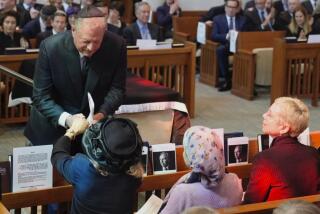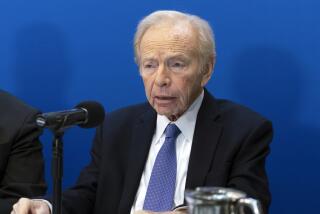Bush Baggage Could Cost Lieberman Primary
- Share via
NEW HAVEN, Conn. — When Sen. Joe Lieberman stopped to campaign at a busy brew pub here Friday, Linda Rogozinski was perched at the bar. As far as Lieberman was concerned, however, she was sitting on the fence.
Rogozinski, a scientist at the Yale University School of Medicine, voted for Lieberman in his three previous Senate races. But he can no longer count on her support -- a sign of the troubles Lieberman confronts as he struggles to avoid defeat in a Democratic primary Aug. 8 that has focused squarely on the war in Iraq.
Rogozinski said she has long admired Lieberman as a man of principle. But his unwavering support of the war increasingly seems to her a stubborn refusal to face facts three years after U.S. forces overthrew dictator Saddam Hussein.
“Lieberman is a good guy ... [but] I just wish he could modify his position on Iraq,” Rogozinski said. “I need to know why it’s so important for him to maintain a position he developed three years ago.”
Such comments explain why Lieberman, 64, faces the risk of repudiation from his fellow Connecticut Democrats six years after Al Gore selected him as his running mate in the 2000 presidential campaign.
Overwhelming discontent in the state about the Iraq war created the opening for a strong challenge by political newcomer Ned Lamont, 52, a wealthy cable television entrepreneur.
But Lieberman is also being battered by a widespread belief among critics that his long-standing commitment to working with Republicans has become counterproductive at a time when President Bush and the GOP congressional majority pursue an aggressive conservative agenda.
“I want a senator who’s out there challenging them ... instead of working with them on their crazy policies,” said Cheryl Curtiss, a West Hartford School District employee, as she waited for Lamont at a rally Saturday night.
With such sentiments in play, the race has spotlighted broader choices that Democrats face nationwide -- not only in this fall’s election, but in the 2008 presidential campaign. Beyond measuring the depth of anger about the Iraq war, the Connecticut primary has offered competing visions of how Democrats can revive their fortunes in a deeply polarized political era.
Lieberman presents himself as an inheritor of President Clinton’s strategy during the 1990s, arguing that his party must ground itself in the political center while seeking opportunities for bipartisan agreement with Republicans.
“I understand why [Democrats] are angry because there has been very tough partisan politics played by the Republicans,” Lieberman said. “But the answer to extremism is not more extremism. The answer
Lamont, whose great-grandfather was a partner of Wall Street tycoon J.P. Morgan, is hardly a liberal firebrand. But he echoes the liberal online activists and bloggers in arguing that Democrats can regain power only by offering more resistance, and a sharper alternative, to Bush’s agenda -- starting with the war in Iraq.
“Look, I’m a businessperson and I like getting things done ... but it does seem to me that Sen. Lieberman is too willing to compromise on principle and he sometimes goes out of his way to poke a stick in the eye of the Democratic Party when the Democrats are supposed to be standing up and presenting a constructive alternative to the Bush agenda,” Lamont said.
The most recent public poll, released by Connecticut’s Quinnipiac University late last month, showed Lamont surging to a 51%-47% lead over Lieberman among likely primary voters.
The poll showed Democrats dividing in a pattern that has shaped many of the party’s recent presidential contests: Lieberman led narrowly among lower-income voters and those without college degrees. Lamont held a commanding advantage among college-educated and more affluent voters, who typically prefer more emphasis on diplomacy than force in foreign policy.
Both camps say the result will likely turn on which side can best motivate its supporters to turn out for a contest in the dog days of summer. The contest is open only to Democrats, but independents have until Monday to register with the party to vote in the primary.
Even if Lamont wins, it will represent only the first round in their duel: Lieberman has said he will run as an independent in the general election if he loses the Democratic nomination.
Lieberman is counting on powerful institutional advantages to pull out a primary win -- he has received endorsements from the state AFL-CIO, several national liberal groups and most local Democratic officials.
Clinton traveled to Connecticut last week to appear with the senator and endorse him. By Friday, Lieberman’s campaign had produced a button showing Clinton with his arm around the senator at the rally -- an intended antidote for the button Lamont supporters have distributed for months showing Bush embracing Lieberman after the president’s 2005 State of the Union Address.
The Lamont button reads “The Kiss”; Lieberman’s camp calls its button “The Hug.”
But even after Clinton’s high-profile intervention, Lamont still appears to be attracting much more energy and enthusiasm than the incumbent.
“They have the passion in this race,” acknowledged one Lieberman advisor who requested anonymity when assessing the race.
Lamont’s advantage was apparent as the two men campaigned in recent days.
On Friday, Lieberman launched a 10-day bus tour of the state. But during its first stops, he drew only small crowds. And at almost every stop, he was dogged by Ed Anderson, a New Haven business owner who followed him in a pickup truck containing giant papier-mache busts of the senator and Bush embracing.
By contrast, about 100 people, many of them standing, crowded into the American Clock & Watch Museum in Bristol Saturday night to hear Lamont; that was more supporters than appeared to turn out at all of Friday’s Lieberman events combined.
Lieberman’s difficulties stem from his posture on the Iraq war. While many Democrats in Congress who initially backed the invasion have criticized Bush’s handling of the conflict, Lieberman has offered a generally upbeat portrayal of progress in Iraq and has warned his party against denouncing the president too forcefully.
Lieberman was one of only six Democratic senators to oppose a party-backed resolution in June urging Bush to begin withdrawing U.S. troops from Iraq later this year. Lamont said he would have voted for that resolution as well as a separate measure, which only a dozen Democrats backed, that called on Bush to withdraw all the troops by next summer.
Lamont supporters repeatedly have accused Lieberman of being so ideologically invested in the war -- and Bush’s overall approach to fighting terrorism -- that he has refused to even question whether the strategy is working.
As Lamont’s support has grown, Lieberman has acknowledged more concern about the war’s direction; in an interview, he called the upsurge in sectarian violence across Iraq a “terrible” development.
But he also said he had consciously muted his criticism of Bush for fear of diminishing public support for the war. And despite the loud discontent he has heard during the primary campaign, he offered little prospect that he would alter his views if reelected.
“Well, I don’t think that I’m going to change my position,” he said. “I may try to work harder so that [voters] understand what my position on Iraq is, and not caricature it.”
Mostly, Lieberman has tried to talk about other issues, those where his views reflect the Democratic mainstream.
At the start of his bus tour Friday, he emphasized his opposition to Bush’s push for drilling in the Arctic National Wildlife Refuge; the senator also unveiled a seven-point agenda built mostly around familiar Democratic goals such as raising the minimum wage and expanding college aid. As the day went on, Lieberman narrowed the lens even more, emphasizing the federal grants he had won to hire more police officers in Meriden, obtain fire department equipment in Naugatuck and refurbish a downtown street in Ansonia.
“It’s not bad to have a little seniority,” he told a crowd at a senior center in Meriden. “I know how to get things done.”
Those arguments found some receptive ears. “He’s done a lot of things for Meriden in the past,” said Ross Gulino, who owns a cafe Lieberman visited.
But such considerations seem unlikely to sway many of those attracted to Lamont. Curtiss said she views Lieberman’s experience as a negative, since he has used it for “aiding and abetting the crazy Bush administration.”
Laura Spitz, a graphic designer from Burlington who is backing Lamont, said Lieberman “enables Republicans to have this veneer of bipartisanship because he is their token Democrat.”
The New York Times raised similar arguments in endorsing Lamont in an editorial Sunday. The Hartford Courant, citing experience and seniority, endorsed Lieberman.
Lamont is pounding the message that elected officials around the country will view next week’s primary results as a referendum on whether Americans want to change direction in Iraq.
“That’s why the vote is so important,” Lamont told one man as he campaigned Saturday outside a bustling barbershop in Hartford. “People are going to say it’s a vote about the war -- should we bring our troops home or should we stay the course?”
That prospect is clearly weighing on many Connecticut Democrats, even those who respect Lieberman. A few hours after Lieberman left the brew pub in New Haven, Rogozinski said that she had reached a decision.
“I have the utmost respect for Joe Lieberman, and I think he has done a good job representing the people of Connecticut,” she wrote in an e-mail. “But if our little primary is being viewed as a referendum on the war in Iraq, then I am voting for Ned Lamont.”
More to Read
Get the L.A. Times Politics newsletter
Deeply reported insights into legislation, politics and policy from Sacramento, Washington and beyond. In your inbox twice per week.
You may occasionally receive promotional content from the Los Angeles Times.










